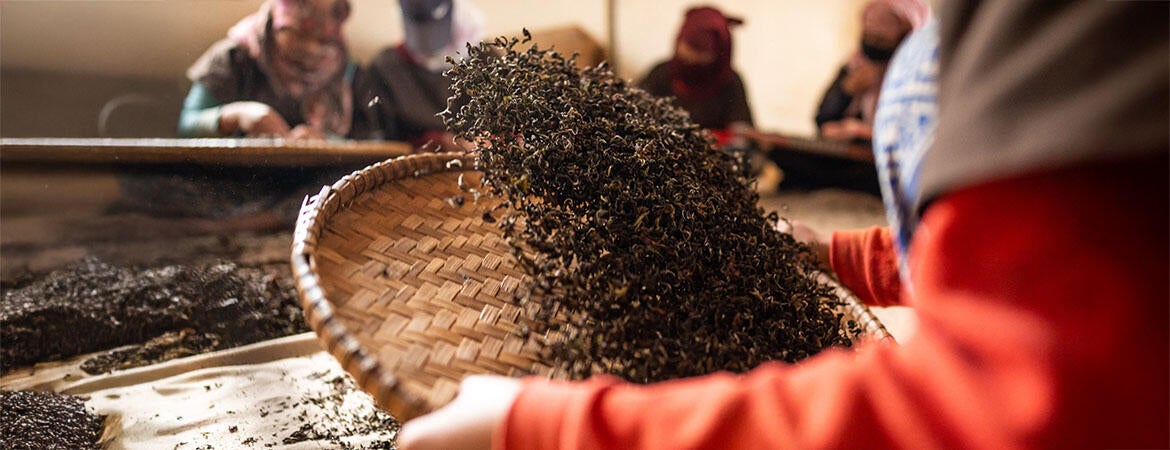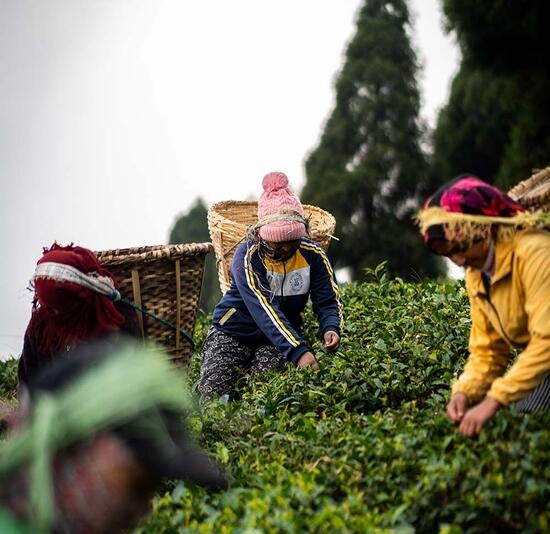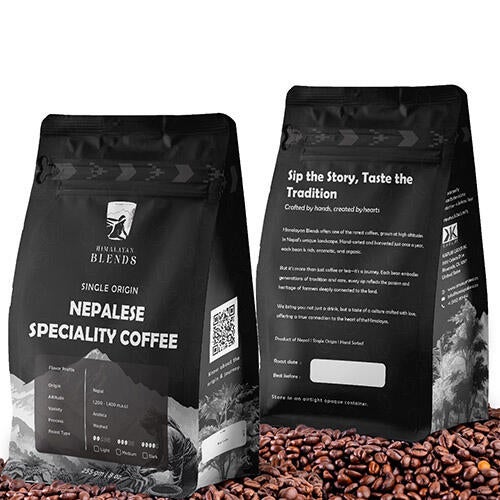

The idea for Himalayan Blends premium tea and coffee brand began to take shape for Nitesh Kapuri ’25 MBA during a summer trip back home to Nepal while studying at UCR.
“As I was traveling around, meeting people, and talking to farmers, I began to understand the struggles they face despite producing the finest tea and coffee,” says Kapuri. “These farmers work tirelessly cultivating some of the highest altitude regions with no pesticides, no shortcuts, just pure craftsmanship.
“Still, they are seen as just another group of producers, when in reality, they are among the best in the world.”
Nepal’s tea farmers won multiple awards at the 2024 World Tea Expo in Las Vegas, and with that news, Kapuri says he “realized that after winning such a prestigious global award, the farmers weren’t receiving the recognition or financial rewards they truly deserved.”
So, Kapuri continued talking to farmers at tea estates and coffee farms to see their methods firsthand. “I wanted to know how the tea was handpicked, hand-rolled, and processed using traditional methods,” he says. “And how high-altitude coffee was grown, harvested, and sorted.
“The more I learned, the more I felt the lack of acknowledgement needed to change. Someone had to bring Nepalese tea and coffee to the global stage and make sure the farmers got recognition and compensation.”
According to Kapuri, most consumers think of South America or Africa when they are looking for premium coffee. “Nepalese coffee is among the rarest in the world, contributing to only 0.003% of global production,” he says, adding that 95% of Nepalese coffee is exported to the Asian market.
Changing the Narrative
“Himalayan Blends is here to change the narrative,” says Kapuri, who founded Kapuri Group in the U.S., which holds Himalayan Blends. He researched exportation to the U.S. and the best way to ship products while maintaining quality. He also met with shipping experts and learned about import regulations, logistics, and packaging requirements.
Kapuri registered Himalayan Blends in the U.S., and says: “I built everything from scratch, from branding and website to packaging design and sourcing directly from farmers.”
For Kapuri, it was important to collaborate directly with farmers to guarantee fair trade and ethical business practices. “I wanted to stay true to my vision of creating something exclusive, rare, and globally recognized,” he says.
At the start, he was handling everything, but as the business grew, he needed employees. “Now, I have a team in Nepal that looks after the day-to-day operations, sourcing, and quality control on the ground. They work closely with our farmers, suppliers, and logistics partners,” he says. “Himalayan Blends is built on strong relationships with our suppliers and distributors. Having reliable team in Nepal helps ensures everything runs smoothly.”
In the U.S., Kapuri focuses on expanding the brand, marketing, distribution, and strategic partnerships.
Supporting Female Employment
Himalayan Blends tea is sourced mostly from female-run farms. Single mothers are 99% of the workforce.
“We are committed to supporting them beyond just employment. We ensure they have food, shelter, and access to education for their children,” says Kapuri. These women are the backbone of our operations; they handpick and hand-roll some of the finest tea in the world, but their work often goes unnoticed.”
With a concentrated effort to tell the stories of these workers and farmers, Kapuri says the company is “creating an opportunity to earn fair wages, gain stability, and secure a better future for their families.
“We want the world to see the faces behind the tea, understand the passion and craftsmanship that goes into every cup, and be part of a movement that empowers these women.”
The same goes for highlighting the male coffee farmers he works with to showcase the craftsmanship and dedication required to produce high-altitude, organic, handpicked coffee. Many of these stories are told on the Himalayan Blends website , where coffee beans, tea sachets, and loose-leaf tea are currently available for purchase, and coffee drip bags will soon be for sale.
Combining Entrepreneurship with an MBA from UCR
After graduating in fall 2025 with his master’s degree, Kapuri plans to help expand his family’s unrelated business in Nepal in addition to expanding Himalayan Blends globally.
Graduate courses at the A. Gary Anderson Graduate School of Management helped him create Himalayan Blends—including Entrepreneurial Management, Strategic Management, and marketing courses.
“Networking opportunities through UCR connected me with mentors and industry experts,” he says. “The hands-on learning approach at UCR allowed me to apply business concepts in real time—branding, sales strategies, supply chain management, and international trade.
“Most importantly, my education has given me the entrepreneurial mindset and resilience to scale Himalayan Blends.”
His father, also an entrepreneur, has been his biggest inspiration, says Kapuri. “I’ve watched him build everything from scratch, turning nothing into something. His journey taught me the value of hard work and thinking differently.”
This summer, Kapuri will also support part-time UCR student interns, who will receive academic credit for their work in various departments: Jasvir Kaur Bhandaal ’26, B2B strategy and partnerships; Isabella Lamberson ’25, content and brand communications; and Nicole Naupari ’25, influencer and social growth. UCR computer science graduate Vasanth Shanmugavadivel is also contributing to tech and strategy efforts.
The Perfect Cup
When asked about the perfect cup of tea, Kapuri says: “Tea is best enjoyed when you slow down, whether it’s the first cup in the morning or a moment of relaxation in the evening. It’s not just about the taste, it’s about the ritual.
On the practical side, he adds: “The best tea begins with fresh, whole leaves, preferably handpicked and organic. Avoid tea bags filled with dust and broken leaves.”
Tea is a way for Kapuri himself to connect with nature, culture, and people, he says. “It carries a story, from the hands that plucked the leaves to the moment you take the first sip.
“I’m passionate about bringing Nepal’s’ hidden gem to the world because every cup should be an experience worth savoring.”

